#Bourgeoisie
Text
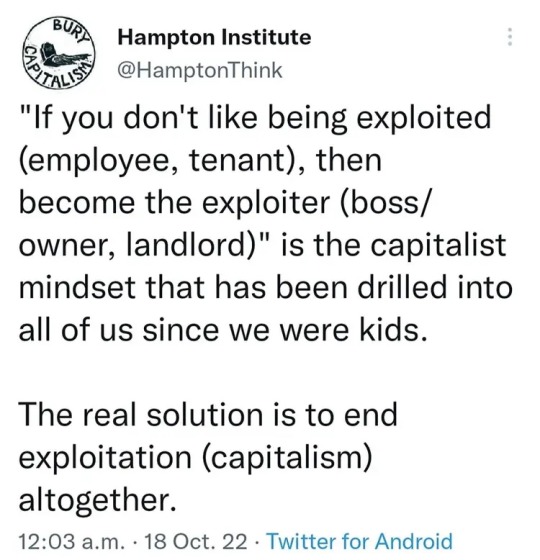
#anticapitalist#anticapitalism#anti capitalism#capitalism#capitalism is inherently exploitative#exploitation#landlords#we don’t need the boss#the boss needs us#bourgeoisie#proletariat#anarchist#anarchocommunism#anarchocommunist#oh no it’s queue
14K notes
·
View notes
Text
Bimbo Bourgeoisie

As a Resistance Spy, it was up to you to feed information to your allies in order to take down the aristocracy.
Fortunately, the countess you serve seems pretty dumb. She never even asked you about your past. Just asked you to look at her necklace.
Her pretty...sparkly necklace.
The one she liked to bounce between her big, pale breasts.
The necklace you had to follow as it swayed.
Bounced.
The breasts you loved to be buried under as she hugged you.
Her obedient servant.
Her good, mindless, obedient slave who'd be so naughty and lead his silly Resistance friends into a trap.
A trap so mistress could get a whole new staff of silly, rebellious toys to tame.
And you'll obey mistress, of course.
Good slaves always obey...
#brainwashing#mindless#mind control#bimboification#brain drain#hypnosis#hypnotized#mind corruption#brainless#bourgeoisie#eat the rich#eat out the rich
345 notes
·
View notes
Text
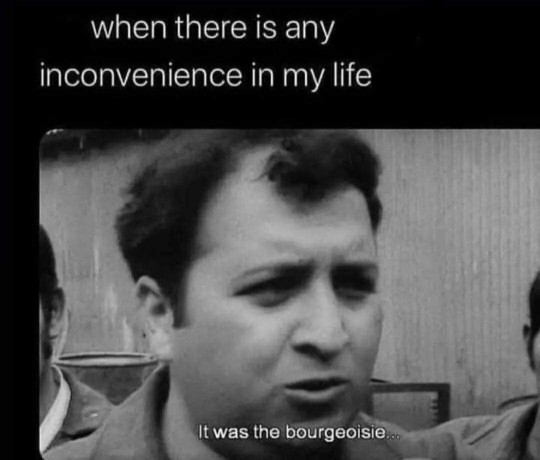
#bourgeoisie#working class#class war#classwar#ausgov#politas#auspol#tasgov#taspol#australia#fuck neoliberals#neoliberal capitalism#anthony albanese#albanese government#anti capitalism#antiwar#antiauthoritarian#anticapitalista#anti capitalist love notes#anti capitalists be like#anticapitalistically#antinazi#anti monarchy#antimoney#eat the rich#antifascist#antifaschistische aktion#funny memes#dank memes#best memes
187 notes
·
View notes
Text
"a hug a day keeps the bourgeoisie away"
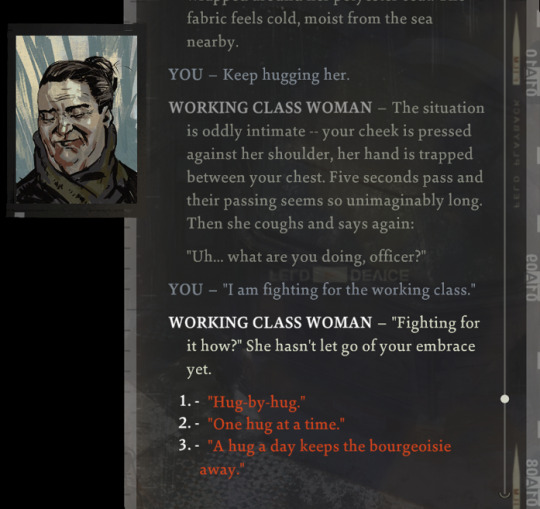
this is now part of my everyday language. people may look at me strangely, but i can't stop. i shan't. i must spread the good word to all who are willing to receive it.
62 notes
·
View notes
Photo
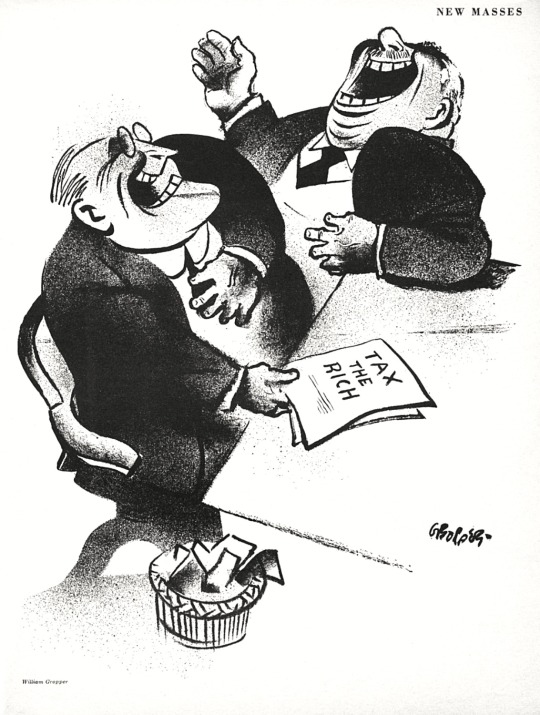
“Tax The Rich“
William Gropper
New Masses Magazine
United States of America
July 9, 1935
#american#cartoon#tax the rich#rich#bourgeoisie#tax#corporation#anti-capitalism#monopoly#usa#united states
156 notes
·
View notes
Text
Ultimate Word Tournament!
Season 2
bourgeoisie (English)
/ˌbʊəɹʒwɑːˈziː/
1. In Marxism, the capitalist class who own most of society's wealth and means of production.
2. (historical) A class of citizens who were wealthier members of the third estate (the common people).
alluring (English)
/əˈlʊɹɪŋ/
Having a strongly attractive or enticing quality.
96 notes
·
View notes
Text

"Je sens me brûler une soif sauvage de sensations violentes, une fureur contre cette existence neutre, plate, réglée et stérilisée, un désir forcené de saccager quelque chose, un grand magasin ou une cathédrale, ou moi-même, de faire des sottises enragées, d’arracher leur perruque à quelques idoles respectées, d’aider des écoliers en révolte à s’embarquer sur un paquebot, de séduire une petite fille, ou de tordre le cou à un quelconque représentant de l’ordre bourgeois. Car c’est cela que je hais, que je maudis et que j’abomine du plus profond de mon cœur : cette béatitude, cette santé, ce confort, cet optimisme soigné, ce gras et ce prospère élevage du moyen, du médiocre et de l’ordinaire."
Hermann Hesse, Le loup des steppes, trad. Juliette Pary, 1927.
21 notes
·
View notes
Photo

The bourgeois prefers comfort to pleasure, convenience to liberty, and a pleasant temperature to the deathly inner consuming fire.
- Hermann Hesse
#hesse#hermann hesse#quote#author#literature#german#bourgeoisie#middle classes#woke#comfort#convenience#character#class
120 notes
·
View notes
Note
Medieval Communes are so interesting. Two questions: do you have any recs for learning more about the social history of these communes for a relative newbie? Also, do you think the conditions are right for Westeros to have commune movements like Europe did?
Gotcha covered.
As for Westeros, I'd recommend reading through my city charter and medieval cities tags. The short version is that GRRM doesn't really put enough emphasis on the burgher class(es) (merchants and artisans) for us to know.
My guess is that the conditions aren't right, because Westerosi cities lack the essential elements of:
municipal self-government, especially in the areas of justice and taxation.
politically active guilds and merchant houses. (Outside of the Antler Men.)
burgher/guild involvement in the militia/city watches.
Without a foundation of state power, socio-economic organization, and military power, it's very hard to overthrow feudal overlords. Hence why populist revolt in Westeros tends to be episodic rather than persistent.
#asoiaf#asoiaf meta#medieval cities#urban communes#city charters#burgher rights#guilds#merchants#bourgeoisie
23 notes
·
View notes
Text
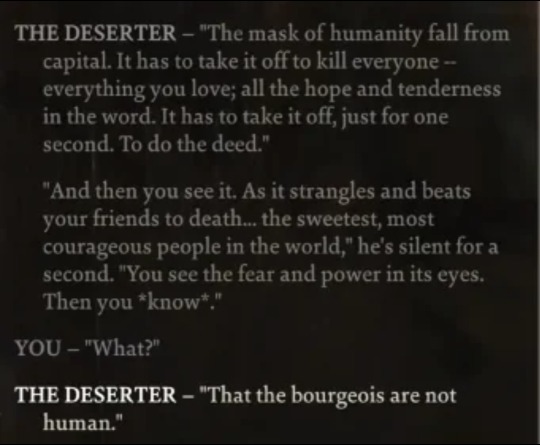
#disco elysium#palestine#apartheid#israel#genocide#gaza#settler colonialism#ethnic cleansing#free palestine#Bourgeois#bourgeoisie#communism
28 notes
·
View notes
Text






9 notes
·
View notes
Text
Okay so my first post is going to be about the link between capitalism and existential angst, which is the most on brand thing possible for me, so if you like this there’ll be much more of it and if not… sorry. 😅
I’ve always had a proclivity for angsty existentialism. Multiple times a housemate has found me sprawled on a sofa moping about the meaning of life which sounds really pretentious but idk I feel like on some level that’s just being a student. And it’s that material side of it that’s got me curious recently like - were these anxieties just a result of the kind of individualistic, listless existence a student inhabits? There’s probably a reason the stereotypes of angst are people with enough wealth to avoid work but not enough respect or expectations to have a solid idea about what they should be doing: Percy Shelley, Lord Byron, Søren Kierkegaard, etc.
In the first volume of his Critique of Everyday Life, Henri Lefebvre calls out Kierkegaard specifically as a prime example of bourgeoise alienation, the result of which was literally creating existentialist philosophy - the idea that we have to create meaning for ourselves by force of will and taking a leap of faith. Lefebvre claims that existential angst is always a result of some sort of alienation. When Marx formulated alienation as the psychological suffering we experience when we are separation from ourselves, each other, the products of our labour, and nature, he was thinking about the way the working class are made to suffer under capitalism, but Lefebvre expands the theory beyond this. He describes how alienation is always relative and present in all types of society for all people within it. Alienation is not just a result of individualism and exploitation - it also presents itself when we feel too far from someone we love, and when we are mystified by the natural world. Crucially, we are alienated when we become detached from the fact that we are dependent on others for our survival, something common to all the bourgeoisie.
Acknowledging this dependency would make us aware of the injustice of how these responsibilities are distributed (according to class, gender, race, etc.), and getting past the separation would require a radical change in lifestyle involving the rejection of the serving of the individual self so integral to bourgeoise morality. It’s hard! But with the lines between proletariat and bourgeoisie becoming more and more blurred with the expansion of the middle class, recognising this particularly bourgeoise suffering is important, I think, if we want to articulate a reason more people can get behind to resist capitalism.
People suffer when they’re separated from people, when their material existence feels so isolated and insignificant that they have to rely on spirituality to give them any sense of grounding, but are unable to be confident in their beliefs so can only ever relate to religion through anxiety (both my best friends speak of religion in this way, and before I read Lefebvre I was tempted to join them because it sounded better than the nihilism I was struggling with). Seriously, read any Kierkegaard and you will know he was not a happy guy. He wrote book called The Concept of Anxiety, and Fear and Trembling for God’s sake. He’s not okay! 🥺 But poor Søren might have been okay if he’d been a bit less self obsessed, acknowledged the value of *inter*subjectivity rather than pure responsibility, and actually married his fianceé rather than worrying about his independent morality, which was really just arrogance. I sound mean but I love him really. He’s very entertaining and *painfully* relatable.
But this is why I find Simone de Beauvoir to be the absolute best of the existentialist canon, because she recognises the need for recognition and connection, even for the powerful. In The Ethics of Ambiguity, she writes about how even tyrants suffer in hierarchical societies because they can never know authentic respect, since people always see their power and the threat implicit in it rather than their whole humanity. This doesn’t mean that we should never violently resist tyranny, because individualism is hard to overcome, even when it’s self-sabotaging, but awareness of this could get more people on the side of equality. This idea is apparently supported empirically in The Spirit Level, by Richard Wilkinson and Kate Pickett, but I haven’t read that one yet. I like to put it in Spinozist terms: the satisfaction of one desire can be excessive when it blinds us to our other needs and presents us from feeling other forms of joy.
On how it can be overcome though, I think Judith Butler offers an interesting frame for thinking about it. Though they’re best known for their work on the social construction of gender, my favourite book of theirs is Giving An Account of Oneself, where they write about how our mental life is a product of all our previous experiences, especially with other people. This seems obvious on some level, but it really undermines individualism. In particular, it deconstructs the distinction between attacking parts of yourself and attacking other people. If our internal and external lives are so interlinked, is it really surprising if attacking ourselves isolates us? Recognising that other people are in some sense present within us is conducive to greater intimacy, and though this can be uncomfortable if we dislike part of them, that doesn’t make it less true, and recognising this can make us more compassionate with everything within us. Self-hatred and hatred of others are intimately connected, and they reinforce each other.
I like to think of the relationship between different parts of myself in terms of Deleuze and Guattari’s machinic unconscious, where our minds are made up of interlocking parts from the larger social context. I think differ though in wanting to negotiate and find equilibrium between them rather than experimenting by letting certain parts go to extremes to make change though. I like the way Jacques Derrida writes about it in The Politics of Friendship, where to recognise the other in oneself, and so recognise the misalignment within ourselves, requires us to be a friend to oneself, which makes friendship so central that it undercuts any potential narcissism because by loving oneself as an other we learn to love others better (as well ourselves).
This doesn’t address the concrete politics of the situation though. The aspect missing is that we have to think of ourselves as inextricably linked to our social and political systems, part of a historical process, and our feelings about those systems are a very real part of that process, and if we want to be true to ourselves we have to act on those feelings rather than repress them. I’m still working out what that means for myself, and as Lefebvre notes it’s this final hurdle that most people fail at, but we can all try.
That kind of went all over the place, but hopefully it’s understandable and valuable, and if not it was helpful for me to articulate all these ideas that have been swirling around in my head for the past year or so. 😅
#existential angst#existentialism#marx#karl marx#henri lefebvre#simone de beauvoir#judith butler#soren kierkegaard#alienation#interdependence#individualism#deleuze and guattari#gilles deleuze#derrida#jacques derrida#deleuze#capitalism#bourgeoisie#communism#anarchism#spinoza#psychoanalysis#politics#social theory#sociology#philosophy
34 notes
·
View notes
Text

#opera#ballet#ballerina#theatre#fashion#aesthetic#interior#enterior#archtitecture#vintage#red velvet#velvet#bourdoir#bourgeoisie#luxury#abundance#socialite#it girl#vogue#style#old money#old money aesthetic#old money moodboard#billionaire lifestyle
14 notes
·
View notes
Text
In retrospect I actually think it was specifically cruel of my work to make me redundant, knowing that I am a single income household.
It's completely galling that as my workplace isn't diverse, the people that made this choice are the type that never have to worry about money in practical terms.
Despite all the good I did and all the value I brought as a person, when push comes to shove I'm just a number that can be 'cut' to save a few pounds in the hope that someone can be brought in to do what I do for cheaper.
And no doubt the shortfall in salary will go to someone at the top as a bonus for 'efficient cost saving'!
I'm very disillusioned.
#personal#text post#2024#capitalism#healthcare#power dynamics#control#bourgeoisie#eat the rich#uk#uk politics
9 notes
·
View notes
Text
When you realize it only costs about $1200 to make a guillotine:
#united front#anticapitalism#communism#socialism#meme#imperialism#capitalism#billionaires#bourgeoisie
6 notes
·
View notes

